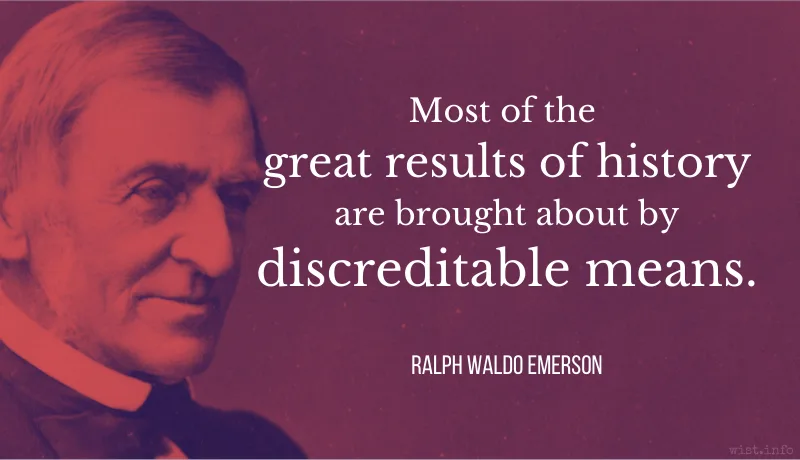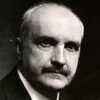Much less evil would be done on earth if evil could not be done in the name of good.
[Es würde sehr wenig Böses auf Erden getan werden, wenn das Böse niemals im Namen des Guten getan werden könnte.]
Marie von Ebner-Eschenbach (1830-1916) Austrian writer
Aphorisms [Aphorismen], No. 97 (1880) [tr. Scrase/Mieder (1994)]
(Source)
(Source (German)). Alternate translation:But little evil would be done in the world if evil could never be done in the name of good.
[tr. Wister (1883)]
Quotations about:
means
Note not all quotations have been tagged, so Search may find additional quotes on this topic.
When I was a student, we used to sit around discussing whether a particular end justified a particular means. On the assumption of everyone from Marx or Machiavelli, I thought that was the question. It took me twenty years to figure out that the means are the ends — and vice versa. Whatever means you use become an organic part of the ends you achieve.
Gloria Steinem (b. 1934) American feminist, journalist, activist
Commencement address, Tufts University (1987-05-17)
(Source)
Violent means are unlikely to reach a peaceful end … the ends and means are a seamless web.
Gloria Steinem (b. 1934) American feminist, journalist, activist
Moving Beyond Words, Part 6 “Doing Sixty” (1994)
(Source)
Regarding the Vietnam anti-war movement.
In this decline of all public virtue, ambition, and not avarice, was the passion that first possessed the minds of men; and this was natural. Ambition is a vice that borders on the confines of virtue; it implies a love of glory, of power, and pre-eminence; and these are objects that glitter alike in the eyes of the man of honour, and the most unprincipled: but the former pursues them by fair and honourable means, while the latter, who finds within himself no resources of talent, depends altogether upon intrigue and fallacy for his success.
[Sed primo magis ambitio quam avaritia animos hominum exercebat, quod tamen vitium propius virtutem erat. Nam gloriam, honorem, imperium bonus et ignavus aeque sibi exoptant; sed ille vera via nititur, huic quia bonae artes desunt, dolis atque fallaciis contendit.]
Sallust (c. 86-35 BC) Roman historian and politician [Gaius Sallustius Crispus]
Bellum Catilinae [The War of Cateline], ch. 11, sent. 1-2 [tr. Murphy (1807)]
(Source)
Also known as Catilinae Coniuratio [The Conspiracy of Cateline]. (Source (Latin)). Alternate translations:At first, indeed, the minds of men were less influenced by avarice than ambition, a vice which has some affinity to virtue; for the desire of glory, power, and preferment is common to the worthy and the worthless; with this difference, that the one pursues them by direct means; the other, being void of merit, has recourse to fraud and subtlety.
[tr. Rose (1831)]But at first ambition more than avarice influenced the minds of the Romans. Which vice however was the nearer to virtue. For glory, honour, command, the good and slothful equally wish for themselves. But the former strives by the right course; to the latter because good qualities are wanting, he works by tricks and deceits.
[Source (1841)]At first, however, it was ambition, rather than avarice, that influenced the minds of men; a vice which approaches nearer to virtue than the other. For of glory, honor, and power, the worthy is as desirous as the worthless; but the one pursues them by just methods; the other, being destitute of honorable qualities, works with fraud and deceit.
[tr. Watson (1867)]At first it was not so much avarice as ambition which spurred men's minds, a vice, indeed, but one akin to virtue. Glory, distinction, and power in the state are equally desired by good and bad, though the first strives to reach his goal by the path of honor, the second, in the lack of honest arts, uses the weapons of falsehood and deceit.
[tr. Pollard (1882)]But at first men’s souls were actuated less by avarice than by ambitions -- a fault, it is true, but not so far removed from virtue; for the noble and the base alike long for glory, honour, and power, but the former mount by the true path, whereas the latter, being destitute of noble qualities, rely upon craft and deception.
[tr. Rolfe (1931)]At first people's minds were taxed less by avarice than by ambition, which, though a fault, was nevertheless closer to prowess: for the good man and the base man have a similar personal craving for glory, honour, and command, but the former strives along the truth path, whereas the latter, because he lacks good qualities, presses forward by cunning and falsity.
[tr. Woodman (2007)]
Most of the great results of history are brought about by discreditable means.
Ralph Waldo Emerson (1803-1882) American essayist, lecturer, poet
Essay (1860), “Considerations by the Way,” The Conduct of Life, ch. 7
(Source)
Based on a course of lectures by that name first delivered in Pittsburg (1851-03).
As the means, so the end.
Mohandas Gandhi (1869-1948) Indian lawyer, anti-colonial nationalist, political ethicist [Mahatma Gandhi]
In Young India (17 Jul 1924)
Compare to this.
I have tried to make it clear that it is wrong to use immoral means to attain moral ends. But now I must affirm that it is just as wrong, or even more so, to use moral means to preserve immoral ends.
Martin Luther King, Jr. (1929-1968) American clergyman, civil rights leader, social activist, preacher
Letter from Birmingham Jail (16 Apr 1963)
(Source)
Let us diligently apply the means, never doubting that a just God, in his own good time, will give us the rightful result.
Abraham Lincoln (1809-1865) American lawyer, politician, US President (1861-65)
Letter to James C. Conkling (26 Aug 1863)
(Source)
The companion before the road, and the road before the destination. But without the destination there is no road, and without the road there is no companion.
Abdal Hakim Murad (b. 1960) British Muslim shaykh, researcher, writer, academic [b. Timothy John Winter]
“Contentions 2,” # 7
(Source)
By hooke or crooke.
John Heywood (1497?-1580?) English playwright and epigrammist
Proverbes, Part 1, ch. 11 (1546)
(Source)
The phrase most likely derives from English tenant rights to gather firewood "by hook or by crook" -- as much loose timber as could be pulled down from branches by a (shepherd's) crook, or cut with from underbrush by a (pruning) billhook. The phrase first appears in the 14th Century.
For when the One Great Scorer comes to mark against your name,
He writes — not that you won or lost — but how you played the Game.
I have almost reached the regrettable conclusion that the Negro’s great stumbling block in his stride toward freedom is not the White Citizen’s Counciler or the Ku Klux Klanner, but the white moderate, who is more devoted to “order” than to justice; who prefers a negative peace which is the absence of tension to a positive peace which is the presence of justice; who constantly says: “I agree with you in the goal you seek, but I cannot agree with your methods of direct action”; who paternalistically believes he can set the timetable for another man’s freedom; who lives by a mythical concept of time and who constantly advises the Negro to wait for a “more convenient season.” Shallow understanding from people of good will is more frustrating than absolute misunderstanding from people of ill will.
Martin Luther King, Jr. (1929-1968) American clergyman, civil rights leader, social activist, preacher
Letter from Birmingham Jail (16 Apr 1963)
(Source)
“Imagine that you are creating a fabric of human destiny with the object of making men happy in the end, giving them peace and rest at last, but that it was essential and inevitable to torture to death only one tiny creature — that baby beating its breast with its fist, for instance — and to found that edifice on its unavenged tears, would you consent to be the architect on those conditions? Tell me, and tell the truth.”
“No, I wouldn’t consent,” said Alyosha softly.
Fanaticism consists in redoubling your efforts when you have forgotten your aim.
George Santayana (1863-1952) Spanish-American poet and philosopher [Jorge Agustín Nicolás Ruíz de Santayana y Borrás]
The Life of Reason or The Phases of Human Progress, Introduction (1905-06)
(Source)



















